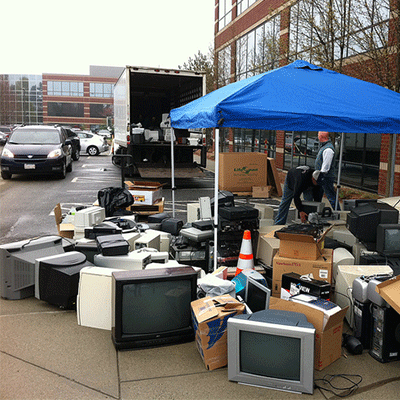 People want e-waste recycling to be like ATMs and online shopping: convenient. Nine out of 10 consumers surveyed last year by the Consumer Electronics Association for its CE Recycling and Reuse 2012 Edition study, agreed it’s important to recycle and 63 percent of the respondents were aware of locations for recycling e-waste. Yet 12 percent opted to dump their devices in the trash anyway because it was the most convenient disposal method.
People want e-waste recycling to be like ATMs and online shopping: convenient. Nine out of 10 consumers surveyed last year by the Consumer Electronics Association for its CE Recycling and Reuse 2012 Edition study, agreed it’s important to recycle and 63 percent of the respondents were aware of locations for recycling e-waste. Yet 12 percent opted to dump their devices in the trash anyway because it was the most convenient disposal method.
Carefully planned and efficiently run electronics collection events, especially in rural locations, can make recycling e-waste convenient enough for people to think twice about putting old computers out on the curb and sending them to landfills. Follow these guidelines to organize an event that makes it easy to recycle old devices and has people looking forward to the next one.
Plan
Good planning requires time, so make sure there is enough of it—30 to 90 days is ideal, depending on the size of the event. Select the date carefully to maximize attendance: avoid holidays and be mindful of other events taking place within the community, such as festivals, sporting events, or even another collection event. But scheduling an event to coincide with Earth Day, or after the holidays when many people receive new technology and are looking for ways to unload the old, can boost attendance at an event.
Also, take into consideration the weather: snow and rain can significantly curtail attendance. As Kevin Kirks, West Region sales manager, Sims Recycling Solutions, noted, “Sunny and 72 degrees make for a good e-waste day.”
Once the date is set for the event, stick to it. Otherwise there could be confusion among people planning to attend the event. With a date in hand, choose a location. Ideal sites provide high visibility, easy accessibility, and can safely accommodate drive-through traffic.
Next, find a recycling partner to process the collected e-waste. The integrity of the event rests on how that collected material is handled, so choose the recycler carefully.
Christopher York, municipal contracts and compliance account executive, Sims Recycling Solutions, recommends touring a potential partner’s facility as the first step in the selection process. During the tour, quiz the recycler about its industry certifications, data security and destruction methods, procedures for processing collected material, use and audits of downstream vendors, and insurance coverage.
Event organizers will want to be able to tell anyone who asks that their e-waste is being processed responsibly in accordance with rigorous environmental, health and safety, and security standards that protect the planet, people, and data. “Audit your recycling partner and be proud of your partner,” said Kirks.
This is also a good time to discuss what other resources the recycler is able to provide for the event, such as pre-event marketing support and event-day logistics, staffing, and transportation.
Promote
No one will come to the event unless they know about it, so spread the word. Prepare flyers to distribute and signs to hang well in advance of the event. Add the event to community calendar listings. Use social media outlets and website listings to reach the broadest possible audience.
Issue a press release to local radio and television stations and newspapers to make them aware of the event. A press release is unlikely to generate much interest on its own, so make a point of following up with these media outlets several times before the event. If the budget allows, consider running radio, television, or newspaper ads.
In all the promotional materials, include information that answers who, what, when, where, and why, as well as a list of the items that will and will not be accepted at the event. This is simple, but important: At least one hour before the start of the event, hang signs where they will be visible to passing traffic. Why? When participants are asked how they heard about a collection event, 40 percent respond that “they were driving by and saw the sign.”
According to Kirks, “The difference between an OK event and a really successful event is often about the press the event gets.”
Motivate
To get something, in this case e-waste, give something. To encourage attendance at the event and increase the amount of e-waste collected, consider offering raffle tickets for a chance to win a prize to reward people for the effort of dropping off old electronics. Grocery store gift cards, local celebrity meet-and-greets, and even new electronic devices, such MP3 players, tablets, or laptops have proven to be popular incentives. Just make sure the winner knows where to recycle that device when it’s time.
Curious about what happens to all that collected e-waste once it arrives at the recycling facility? View this video to find out how shredding, separating, and hand sorting reduce old electronics into materials that can be used to make new products. Click Here.

